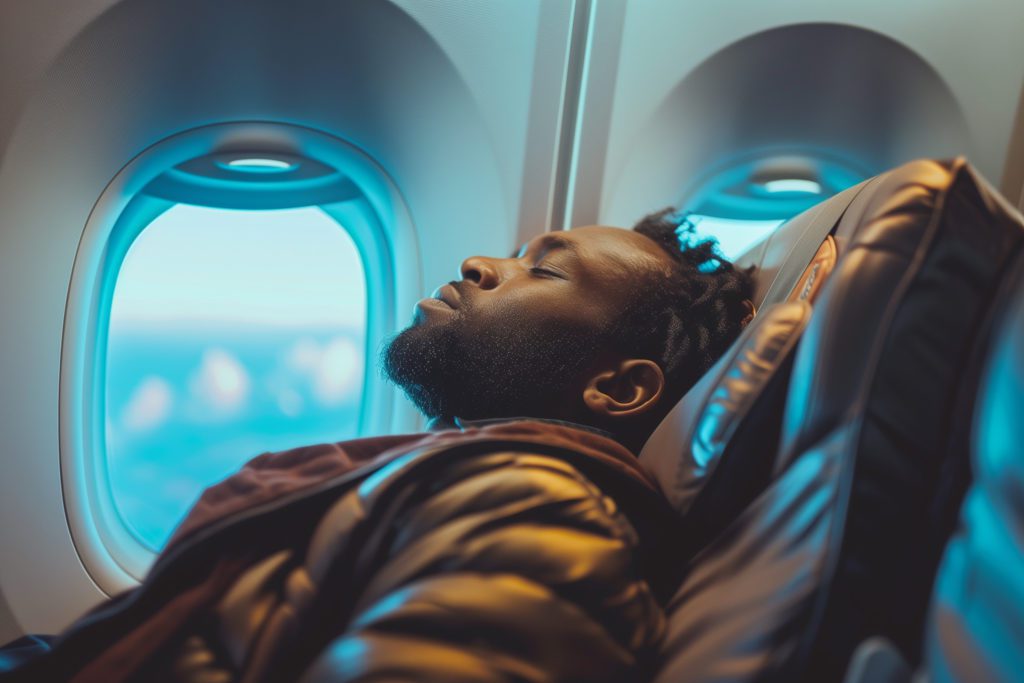
Natural Sleep Aids to Help You Wind Down
If you need to get better sleep, consider these natural sleep aids: chamomile, magnesium, lavender, melatonin, valerian root, and passionflower.

About eight percent of U.S. adults regularly use prescription sleep medicine to sleep. But, these medications can have serious side effects and shouldn’t be the first solution for insomnia. There are several natural remedies that may help you to sleep better, including magnesium, valerian root, and melatonin. Many of these alternative remedies have been well-researched by scientists. While they may not cure insomnia for good, natural sleep aids can help you get your sleeping cycle back on schedule.
Chamomile Tea
Chamomile is an herb that comes from the Asteraceae plant family. It has been used for centuries as a natural remedy for sleep. Many people enjoy it in tea form before bed. Scientists believe that chamomile helps with sleep because it contains an antioxidant, apigenin, that binds to receptors in the brain that promote relaxation.
How effective is chamomile for sleep? A 2016 study published in the Journal of Advanced Nursing found that chamomile tea helped improve sleep in postnatal women who suffered from insomnia.
How to use: Drink a cup of chamomile tea about 45 minutes before bed.
Magnesium Supplements
Magnesium is a mineral that's essential for many body functions, including nerve and muscle functioning. Some researchers believe that taking magnesium before bed can help improve sleep quality. That is because magnesium helps regulate melatonin, the hormone that controls your sleep-wake cycle or circadian rhythm. Magnesium also helps reduce anxiety, which might help you sleep better if worry keeps you awake at night. Some evidence suggests that magnesium can also help with restless legs syndrome (RLS), which can improve sleep. This is a condition that causes a strong urge to move your legs when you lie down at night.
How to use: Adults can take 350 mg of magnesium per day for sleep.
Lavender Aromatherapy
Lavender is one of the most popular essential oils used in aromatherapy. Studies supporting the use of lavender as a sleeping aid are solid. A study published in the Journal of Alternative and Complementary Medicine found that people who used lavender for aromatherapy felt more refreshed when they woke up in the morning. A systematic review, also published in the Journal of Alternative and Complementary Medicine, found that inhaling lavender had a positive effect on people with mild sleep disturbances.
How to use: Put a couple of drops of lavender oil on a cotton ball. Place the lavender-soaked cotton ball beside your pillow.
Melatonin
Melatonin is a hormone released by the brain that helps promote sleepiness. Of all the over-the-counter natural sleep aids available, melatonin is the most popular. According to a 2023 survey from the American Academy of Sleep Medicine (AASM), almost two-thirds of adults have used melatonin to sleep. Melatonin is generally safe and effective.
How to use: Typically, melatonin is started at 2 mg taken about 1 hour before bedtime. The maximum dose is 10mg a day. Melatonin supplements aren’t for everyone. For some people melatonin can leave them feeling groggy the next morning or even nauseous.
Valerian Root
Valerian is a tall grassland plant that has been used since the second century A.D. to treat insomnia. The results of numerous studies indicate that valerian can help you fall asleep quicker and get better rest.
How to use: For best results, take 300-600 mg two hours before bed.
Passionflower
Passionflower (Passiflora incarnata) is a plant that increases levels of gamma-aminobutyric acid (GABA) in the brain. GABA is an inhibitory neurotransmitter that counters neurotransmitters that cause excitement. So, increasing it produces a calming effect, and brings about feelings of sleepiness and relaxation.
A 2016 study, published in the journal Homeopathy, found that passionflower helped relieve sleep disorders when taken for one month. It also helped reduce anxiety levels, which can improve sleep. Another study found that passionflower significantly increased slow-wave (deep) sleep.
How to use: You can take a 90 mg capsule just before bed. Passionflower should not be taken for more than two months. It should also not be taken by pregnant women.
Good Sleeping Habits
Natural sleep aids should not replace good sleeping habits, such as:
- Stick to a sleep-wake routine - Use your Apple Watch to establish and maintain a sleep routine. Pair it with Pillow to set a sleep schedule and track your sleep stages, time in bed and other sleep metrics.
- Limit daytime naps - It’s okay to take a power nap as long as you take it more than four or five hours before bed. Also, keep your nap to less than 20-30 minutes.
- Part ways with your phone - The blue light emitted by smartphones can interfere with your body’s melatonin production. This is one of the key hormones that help regulate your sleep cycle. Therefore, shut down phones and other electronic devices 60 minutes before bed.
- Quiet your mind - Listen to relaxing bedtime sounds (on Pillow) to help your mind wind down for the night.
- Don’t watch the clock - Checking the time while you are trying to sleep can make you anxious and less likely to drift off to sleep. If you can’t sleep, get out of bed and do something relaxing like bedtime yoga.
- Exercise early in the day - Regular exercise is important for sleep—but your exercise timing is just as important. Make sure you exercise at least 90 minutes before bed.
Are Natural Sleep Aids Safe?
Natural sleep aids aren’t regulated or approved by the Food and Drug Administration (FDA). So, it can be difficult to know which products are effective or safe. If you are considering a natural sleep aid, talk with your doctor. They can provide you with guidance based on your other medications and medical history.
Final Thoughts on Natural Sleep Aids
The above natural approaches to sleep can help you if you suffer from occasional sleep problems. However, if you are having trouble sleeping on a regular basis, then it’s a good idea to address your sleep problems before they get worse. In that case, you should reach out to a board-certified sleep specialist.
FAQ
Is it okay to use natural sleep aids and prescription medication?
Combining natural sleep aids with prescription medication should only be done under the guidance of a healthcare professional. Some natural remedies may interact with medications or amplify their effects, leading to undesirable side effects. Always consult a doctor to ensure safety and compatibility.
Are natural sleep aids safe to use long-term?
While most natural sleep aids are considered safe for occasional use, they may not be suitable for everyone, especially those with underlying health conditions or those on medication. Long-term reliance can sometimes mask chronic sleep issues. Always consult a healthcare professional for tailored advice if you’re considering regular use.
What are the limitations of natural sleep aids?
Natural sleep aids may be less effective for individuals with severe insomnia or chronic conditions such as sleep apnea. They are intended as short-term or complementary measures rather than standalone solutions. Addressing stress, lifestyle factors, or underlying medical conditions is crucial for sustainable sleep improvements.
How does melatonin differ from other natural sleep aids?
Unlike herbs like valerian or chamomile, which promote relaxation, melatonin directly impacts your body’s internal clock by signaling it to prepare for sleep. It is particularly useful for addressing disrupted sleep patterns caused by jet lag, shift work, or insomnia related to circadian rhythm disturbances.
Can you become dependent on melatonin supplements?
Unlike some prescription medications, melatonin is not physically addictive. However, relying on supplements long-term can lead to psychological dependency or hinder the body's ability to produce melatonin naturally. It's best to use it as a short-term aid while addressing sleep hygiene and lifestyle factors.
What forms do natural sleep aids come in?
Natural sleep aids are available as teas, capsules, gummies, tinctures, or sprays. Capsules and gummies are popular for precise dosing and convenience, while teas are ideal for a calming bedtime ritual. Tinctures provide faster absorption, and sprays are often used sublingually for quick effects.
Are sleep gummies as effective as capsules?
Sleep gummies and capsules can be equally effective if they contain the same active ingredients, like melatonin or valerian root. Gummies are often preferred for taste and ease of consumption, while capsules are more discreet and may have fewer added sugars or artificial ingredients.
Are herbal sleep aid capsules better than teas?
Herbal capsules, like those containing valerian root or passionflower, are more concentrated than teas and offer precise dosing. Teas, however, provide a soothing bedtime routine and a milder effect. Choosing between them depends on individual preference and the severity of sleep issues.

Written by
Emily Mendez
Emily Mendez is a former therapist and mental health author. She is one of the leading voices in mental health. Emily's writing has appeared in eCounseling, SonderMind, and more. Emily is frequently interviewed by Healthline, Fatherly, INSIDER, Family Circle, and other national media for her advice and expert opinion on the latest mental health topics.
Download Pillow
Get help
Press & News
Legal
Connect
X (Twitter)
Company
Copyright © Neybox Digital Ltd.


